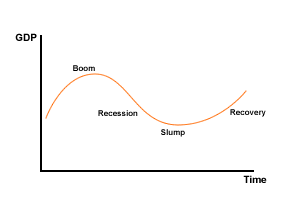The Business Cycle

Business Cycle
The business cycle is the periodic, but irregular up-and-down movements in economic activity, measured by fluctuations in real GDP and other macroeconomic variables.
The business cycle is an alternative name for the trade or economic cycle, so these terms are often used interchangeably.
Figure 1 below shows a possible business cycle.

Figure 1 A Business Cycle
Changes in the business cycle seem to be caused by a number of factors, or more realistically, by several of the following happening in the same time period:
- Changes in what is known as business confidence. When a business is confident about the future it is more likely to invest in new capital, such as buildings. When confidence is low, new investment is often postponed, and indeed a firm may sell fixed assets if demand for their products is falling.
- If it appears consumer demand is about to fall, businesses will de-stock and sell what they have without replacing all that is bought by consumers. This means a fall in output. If the business cycle is thought to be moving upwards then business will restock in preparation for increased demand - this increases output.
- Changes in government policies, which are thought to be either causing the economy to expand or contract. A set of policies designed to increase economic growth (e.g. a cut in interest rates) will normally increase business confidence, whilst policies designed to say control inflationary pressures (e.g. increases in taxation or interest rates) will cause business confidence to fall. Following the recent recession, many governments are looking to cut their deficits by reducing spending. This is likely to lead to an economic downturn.
- Changes in consumer behaviour, which are often the result of other macro factors. An increase in interest rates might cause consumer confidence to fall and have an impact on business confidence. A period of high employment might have the opposite effect.
If you would prefer to view this interaction in a new web window, then please follow the link below:
For managers of businesses, the key point to remember about the business cycle is that it has existed for over 150 years, so when an economy looks especially positive, it should be remembered that a recession may follow and the business should prepare for this in the 'good times'. The same should apply to governments. The UK chancellor in 2007 claimed in his last budget before becoming Prime Minister that because of his economic policies, the UK "would never return to the old boom and bust". The deep global recession that soon followed proved that the business cycle is alive and kicking!
The effect and implications of the business cycle
If you would prefer to view this interaction in a new web window, then please follow the link below:

Find the economic growth figures for the country where you live and try to establish what stage of the economic cycle the country is in; then consider the potential consequences for domestic businesses. To find data for your country try starting with the OFFSTATS site. You can browse this site by country and subject e.g. 'France' and 'economic growth'.
With globalisation comes increasing economic interdependence, where the problems in one country may quickly ripple outwards to other regions of the world.

Europe woes herald prolonged recession fears - February 2010
 Just as America's recession began to ebb, trouble was brewing in Europe as the global economy struggled toward a recovery. A rout in stock markets that began in Europe spread to Wall Street on Thursday and around the globe to Asia on Friday, amid fears that Europe may be the world's next financial flashpoint. Pressure has been mounting across the Atlantic as Greece, Portugal and a handful of struggling countries that use the Euro scramble to pay off mountains of debt accumulated from years of profligate spending.
Just as America's recession began to ebb, trouble was brewing in Europe as the global economy struggled toward a recovery. A rout in stock markets that began in Europe spread to Wall Street on Thursday and around the globe to Asia on Friday, amid fears that Europe may be the world's next financial flashpoint. Pressure has been mounting across the Atlantic as Greece, Portugal and a handful of struggling countries that use the Euro scramble to pay off mountains of debt accumulated from years of profligate spending.
The Dow Jones industrial average slid 2.61 percent as American investors grew more uncertain about Europe's economy. Stock markets across Europe slumped as much as 6 percent, and worries that the troubles might push even big European nations like Spain into a financial crisis drove the Euro to $1.37, a seven-month low against the dollar. Asian markets echoed the losses on Friday. The Nikkei in Japan shed 2.9 percent, and the Hang Seng in Hong Kong was also down 2.9 percent in afternoon trading.
Problems in Greece began the panic as the government proposed far-reaching cost-cutting plans to curb a deficit of 12.7 percent of gross domestic product - more than four times the permitted ceiling for countries using the European Union's single currency. That has prompted alarm in markets, and created arguably the biggest challenge for the euro since its inception. The Greek prime minister announced a series of additional austerity measures, including the extension of a broad public sector wage freeze in 2010 and an increase in fuel taxes. He also hinted at raising the retirement age.
The crisis caused by Greece's wayward economic management has posed unprecedented challenges for the 16 countries in the Euro zone. The Euro fell to a six-month low against the dollar last week - before recovering slightly - on fears that a Greek default would undermine other weak members, leading to a domino effect. The markets have been alarmed by the size of deficits in Portugal, Spain and Ireland.
"Greece is in the centre of a speculative game aimed at the euro," the Greek prime minister said in a televised speech. "We are the weak link in the euro zone. We must act immediately and decisively."
